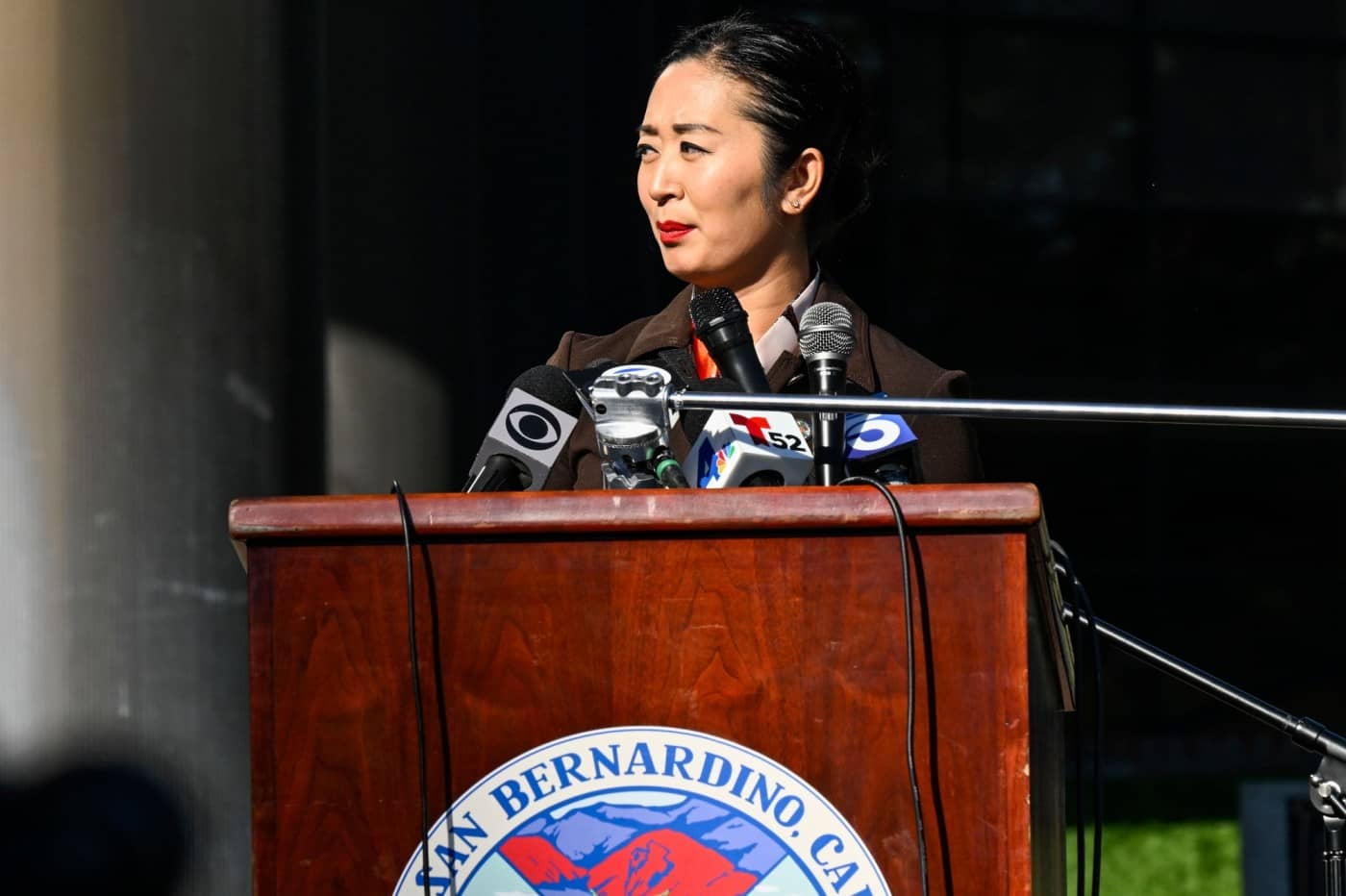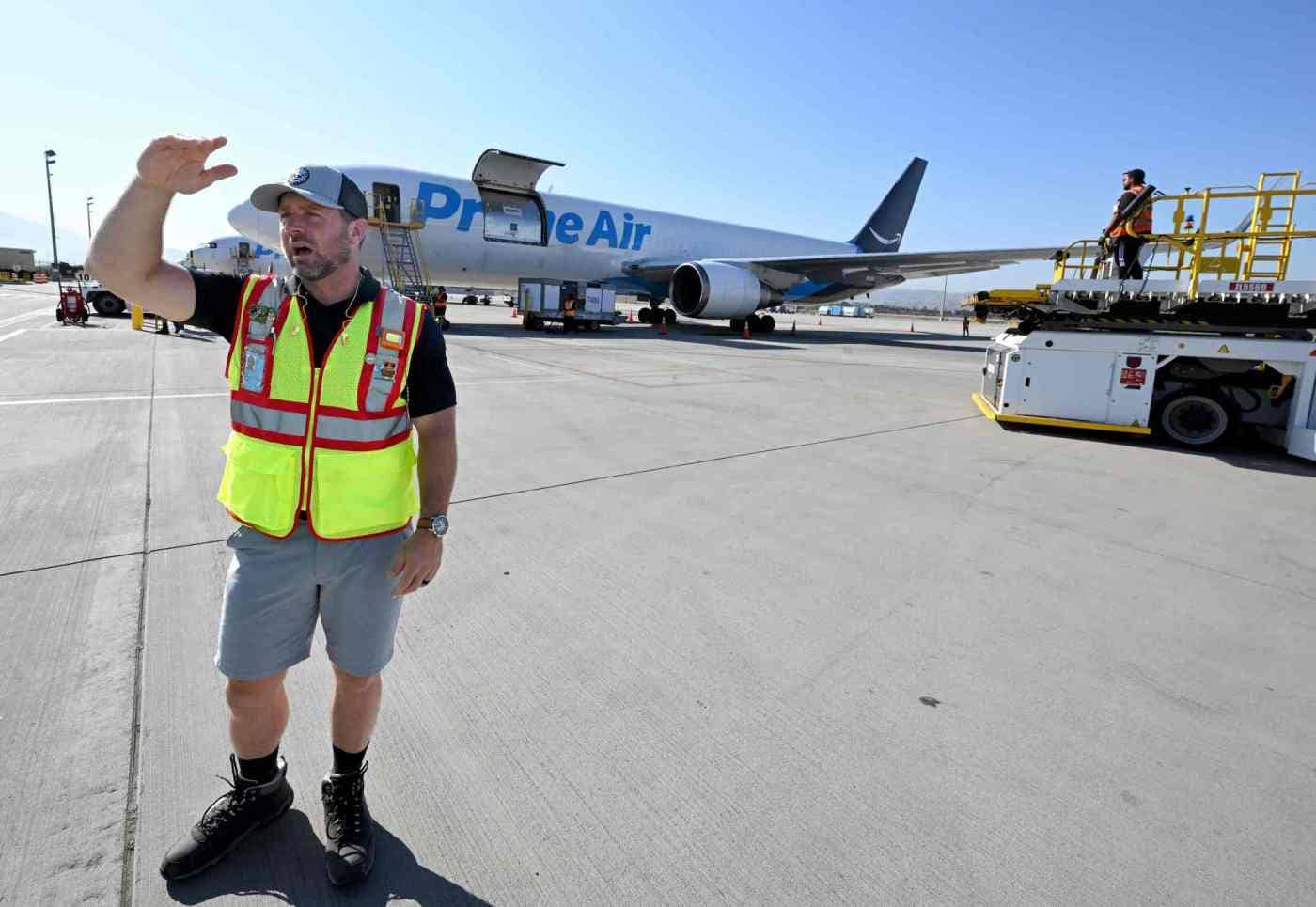Freed from the constraints of a civil rights lawsuit and court-ordered injunction, San Bernardino officials on Wednesday, Oct. 2, declared the city will soon begin clearing homeless encampments at its parks and open two new shelters.
“The lifting of the injunction gives us options for addressing the unhoused individuals compassionately as we clean up our parks,” Mayor Helen Tran said during a news conference outside City Hall. “The city expects the encampment cleanups at our parks to resume in the upcoming weeks and we will post cleanup notices in advance in accordance with our policy.”
The lawsuit and resulting injunction tied the city’s hands even though the U.S. Supreme Court ruled in June that homeless encampment bans are permitted and Gov. Gavin Newsom in August threatened California cities with a loss in state funding if they did not begin cleaning up encampments, Tran said.
On Monday, the ACLU Foundation of Southern California announced a “first-of-its-kind” settlement, reached Sept. 25, in which the city agreed to adopt a new policy preventing the destruction of homeless people’s property during encampment sweeps and ensure reasonable accommodations for the unhoused with disabilities.
The lawsuit, filed in August 2023 on behalf of three homeless residents, one of whom used a wheelchair, and the nonprofit SoCal Trash Army, alleged the city disregarded their constitutional rights, destroyed their personal property — including medicine, vital documents, medical equipment and tents — and left them in dangerous situations when they were ordered to vacate city parks where they were living.
Plaintiff Noel Harner, who uses a wheelchair, alleged in the lawsuit he was given a one-week voucher to stay at a motel after he was vacated from Perris Hill Park, but received no help moving himself or his property. Once the voucher expired, Harner alleged he had nowhere to go.
A preliminary injunction granted in January by U.S. District Court Judge Terry J. Hatter barred the city from removing or displacing unhoused residents and their belongings, and required the city to restructure how encampment cleanups are conducted, Tran said.
“Since the injunction was ordered in January, the number of tents at city parks has grown significantly. As a result, usage of our parks by our residents has declined and the conditions at the parks have deteriorated,” Tran said.
The city’s new policy requires, among other things, that the city post cleanup notices at all encampments within 72 hours of the scheduled cleanup date and time. If the cleanup does not occur within three hours of the scheduled time, it must be rescheduled and a new notice posted. Cleanup crew workers will wear body cameras to record and document the encampment cleanups, city spokesperson Jeff Kraus said.
Homeless individuals will be provided colored plastic bags to store their property up to 90 days and discard trash. If the property is left unattended during an encampment cleanup, it will be tagged with a notice saying city staff will return in 24 hours to check on it. If the property is still unclaimed, it will be stored for 90 days, and an address provided on where the property can be claimed.
During Wednesday’s news conference, interim City Manager Rochelle Clayton said the city has designated a disabilities coordinator to oversee requests by disabled homeless individuals to provide reasonable accommodations before and during encampment cleanups. The city also has developed a flier it will disseminate to homeless residents at encampments citywide informing them about the city’s new encampment cleanup policy and procedures.
Clayton said San Bernardino has made significant progress in providing new shelter beds for the homeless at full-service facilities.
Earlier this year, the city broke ground on a 140-bed interim housing facility in partnership with the nonprofits Lutheran Social Services of Southern California and Dignity Moves. Construction is expected to be completed by the end of the year.
The shelter, planned for a January opening, will be at 1354 G St., Kraus said.
Last month, Clayton said the city put out to bid proposals for the construction of a new homeless navigation center at a former school site at 796 Sixth Street. The city is pushing to have the center open in the fall of 2025.
The city also is using $1 million in federal funding from the American Rescue Plan Act for motel vouchers to assist homeless individuals, and also will continue working with area shelters to provide additional bed space for the homeless as it becomes available, Clayton said.
The American Rescue Plan was enacted in 2021 to help the country recover from the economic and health impacts attributed to the COVID pandemic.
Desiree Sanchez, community engagement and policy advocate for the ACLU Foundation of Southern California, said she was excited to see the city finally begin working to open more shelters and expand bed space for its homeless residents.
Related links
San Bernardino violated rights of homeless residents living in parks, lawsuit alleges
Federal judge temporarily bans San Bernardino from displacing homeless residents
Lawsuit settlement ensures protections for San Bernardino’s homeless community
Supreme Court allows cities to enforce bans on homeless people sleeping outside
Gov. Newsom helps clear LA homeless camp, issues funding threat
“We’ve had $22 million earmarked to assist housing solutions and housing services for our unhoused community for more than four years now, and they’re just barely starting to work on spending some of those funds,” said Sanchez, a San Bernardino resident for more than a decade who said she was formerly homeless.
Sanchez said her organization is pushing for the city to provide noncongregate housing for the homeless to help the city’s unhoused establish permanent residency. And with $22 million, she said at Wednesday’s news conference, the city has plenty of money to do it.
Tran said the city remains committed to providing a “pathway to services, opportunities and housing” for its homeless population.
“This is not something that will be completed in a day, a week or even a month, but together, with our county and community partners, we are committed providing the resources necessary,” Tran said.



